The Centrality of Communities and Civil Society in Epidemic and Pandemic Prevention. A Framework for Improved Preparedness and Response
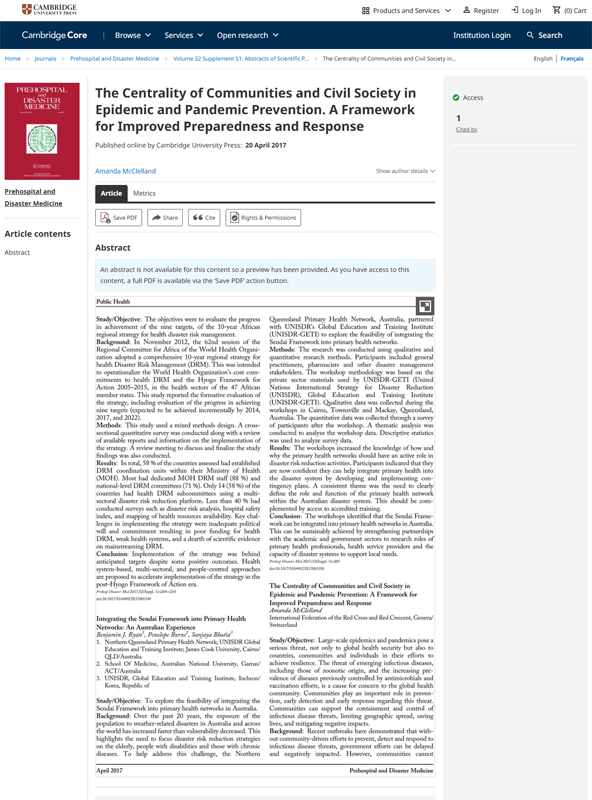
Large-scale epidemics and pandemics threaten global health security and community resilience, especially concerning emerging infectious diseases and the resurgence of previously controlled conditions. Communities play a vital role in preventing, detecting, and responding to these threats, as demonstrated in recent outbreaks. Effective community involvement enhances government efforts and mitigates negative impacts. This study emphasizes the […]
The amended international health regulations: Implications and challenges for domestic legal frameworks
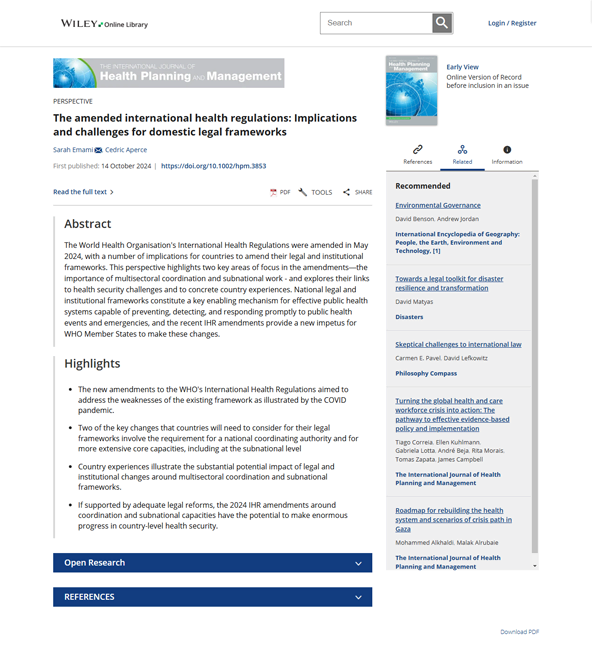
In The International Journal of Health Planning and Management, Resolve to Save Lives argues that the amendments to World Health Organization’s International Health Regulations (WHO IHR)—especially the emphasis on multisectoral coordination and strengthening subnational capacities— offer an important opportunity for countries to bolster their public health systems. As demonstrated by the COVID-19 pandemic, it is […]
The true cost of failing to protect health care workers
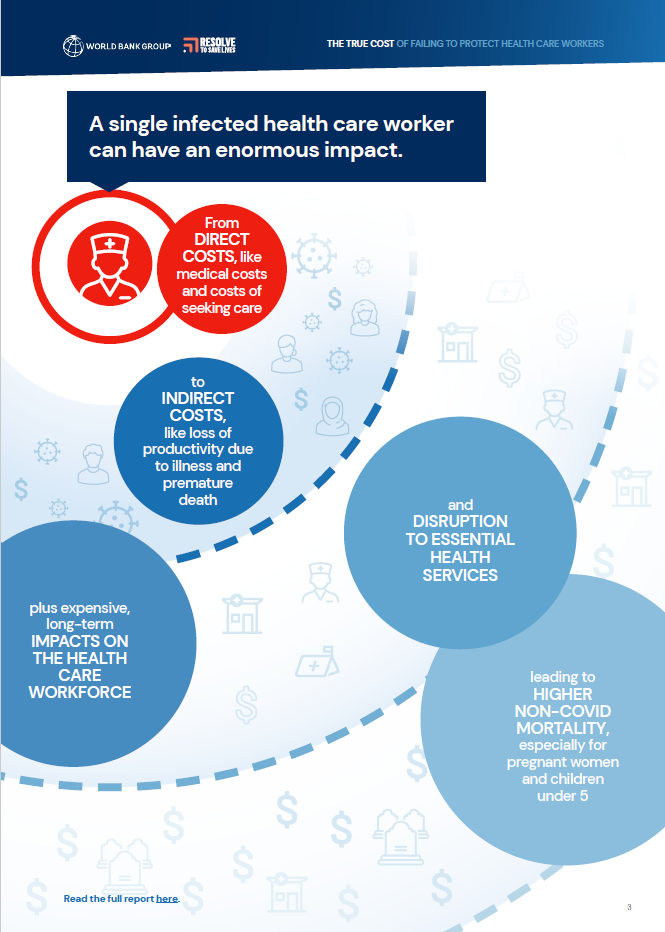
A landmark study from the World Bank and Resolve to Save Lives used a “cost-of-illness” methodology to measure the broader socio-economic costs of health care worker infections and deaths from COVID-19—including the costs of disruption to essential health services due to a compromised health workforce.
TB preventive therapy: uptake and time to initiation during implementation of ‘7-1-7’
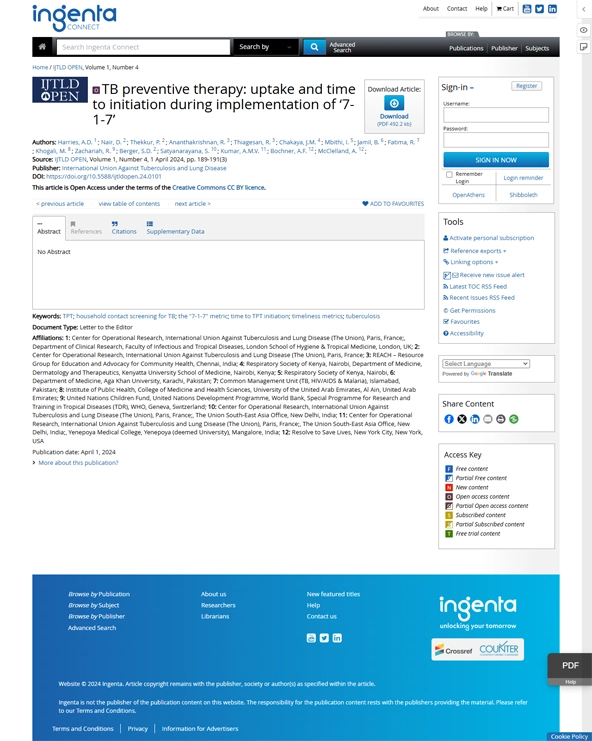
Can the 7-1-7 target increase the number of household contacts (HHCs) of tuberculosis patients initiated on preventive therapy? In this letter published in he International Journal of Tuberculosis and Lung Disease, our colleagues at International Union Against Tuberculosis and Lung Disease describe how the 7-1-7 metric was adapted for TB preventive therapy (TPT), requiring HHCs […]
Safer primary healthcare facilities are needed to protect healthcare workers and maintain essential services: lessons learned from a multicountry COVID-19 emergency response initiative
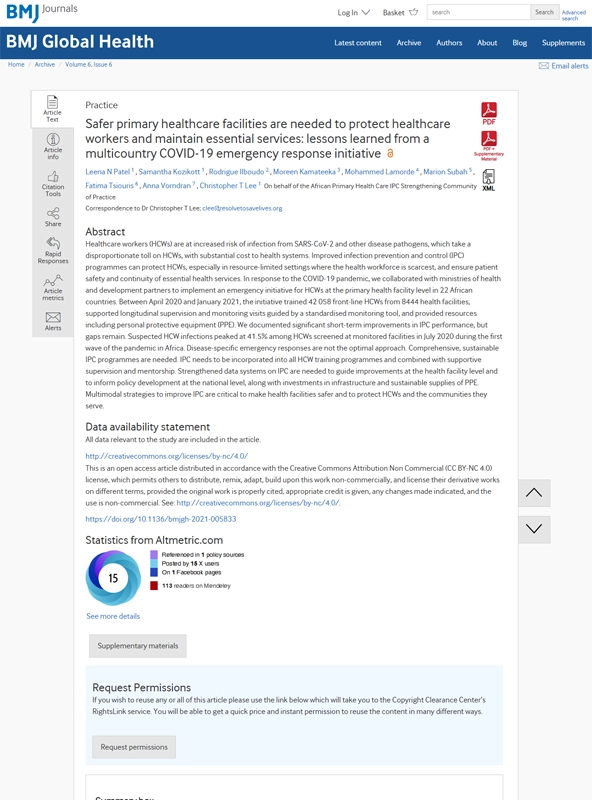
While an infection prevention and control initiative improved COVID-19 infection rates for health care workers in Africa, ongoing challenges demonstrated the need for long-term investments in sustainable IPC programs. In BMJ Global Health, Resolve to Save Lives examines an infection prevention and control (IPC) initiative implemented in 22 African countries from April 2020 to January […]
Reviewing Health Security Capacities in Nigeria Using the Updated WHO Joint External Evaluation and WHO Benchmarks Tool: Experience from a Country-Led Self-Assessment Exercise
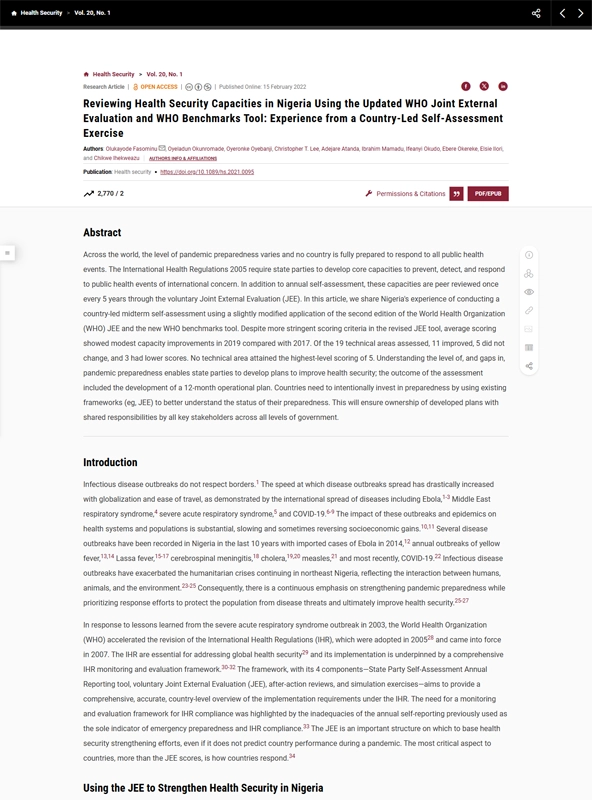
Nigeria’s experience with a self-assessment of pandemic preparedness underscored the need for investment and stakeholder involvement to strengthen health systems. Writing for Health Security, our colleagues at Nigeria Centres for Disease Control and Prevention reviewed Nigeria’s experience conducting a midterm self-assessment of its pandemic preparedness using a modified World Health Organization (WHO) Joint External Evaluation […]
Rapid scale-up of COVID-19 training for frontline health workers in 11 African countries

Effective outbreak response requires sustained investments in health systems—going beyond training to include adequate equipment, space and staffing levels. For Human Resources for Health, our colleagues at ICAP at Columbia University analyzed a COVID-19 response training program for health care workers in 11 African countries in mid-2020. While confidence in managing COVID-19 increased, barriers like […]
Psychosocial determinants of adherence to public health and social measures (PHSMs) in 18 African Union Member States during the early phase of the COVID-19 pandemic: results of a cross-sectional survey
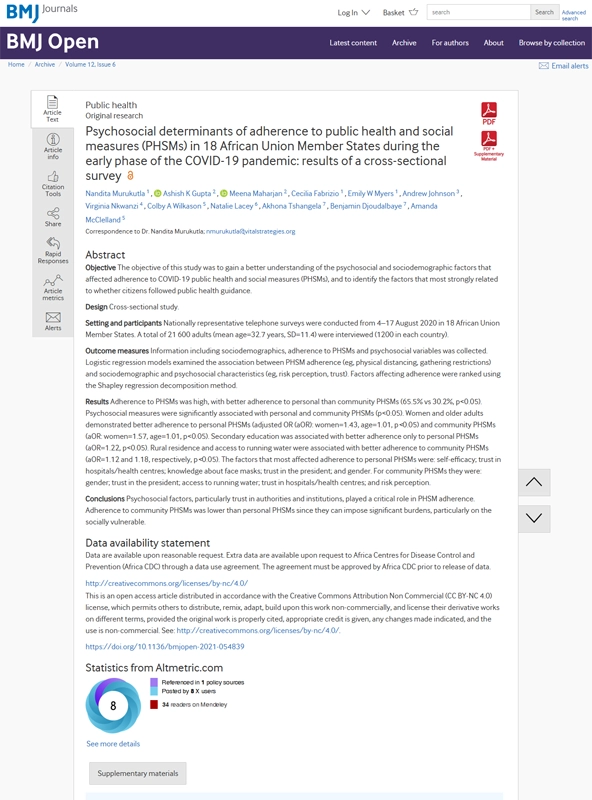
Trust in authorities, a sense of control over one’s environment and behavior, and access to resources influenced adherence to public health and social measures during the COVID-19 pandemic. Writing in BMJ Open, experts at Resolve to Save Lives analyzed psychosocial and sociodemographic factors influencing COVID-19 public health and social measure (PHSM) adherence through a cross-sectional […]
Protecting the world from infectious disease threats: now or never
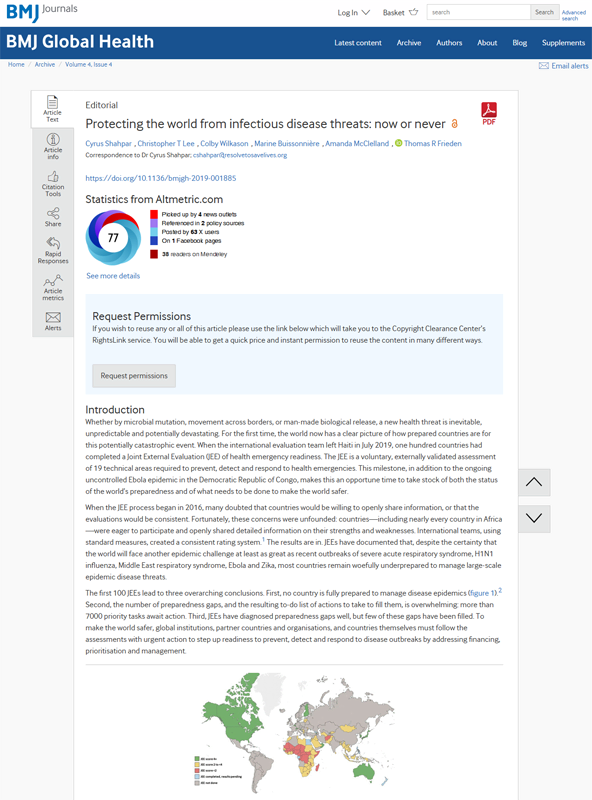
There is an urgent need for global cooperation, leadership, and sustainable financing to address critical gaps in health preparedness as revealed by the World Health Organization (WHO)’s Joint External Evaluation (JEE). Writing in BMJ Global Health, experts at Resolve to Save Lives highlight the results of WHO’s JEE process, in which 100 countries assessed their […]
Preparing for pandemics and other health threats: societal approaches to protect and improve health
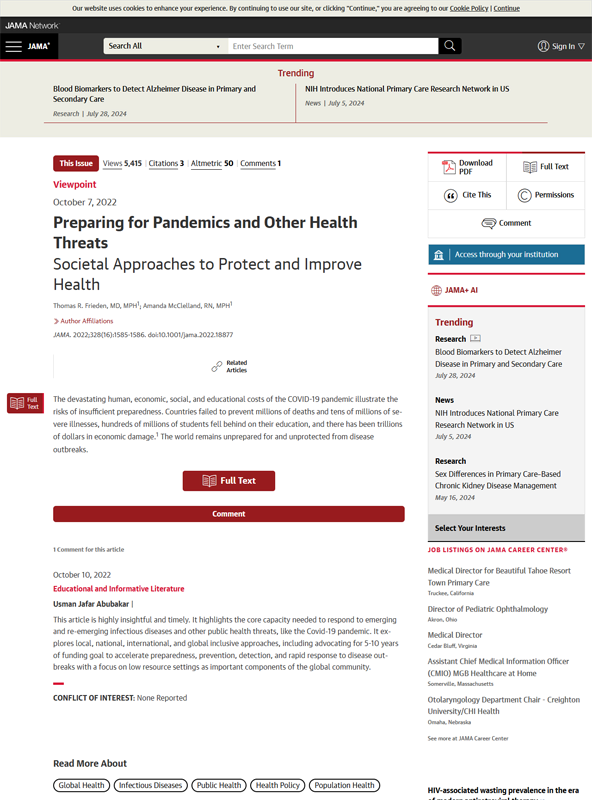
There is an urgent need for sustained funding and coordinated global efforts to strengthen health security capacities and prevent future pandemics. Writing in the Journal of the American Medical Association, experts from Resolve to Save Lives analyze critical lessons from the COVID-19 pandemic, highlighting gaps in preparedness that led to millions of deaths, economic losses, […]
Nigeria’s joint external evaluation and national action plan for health security
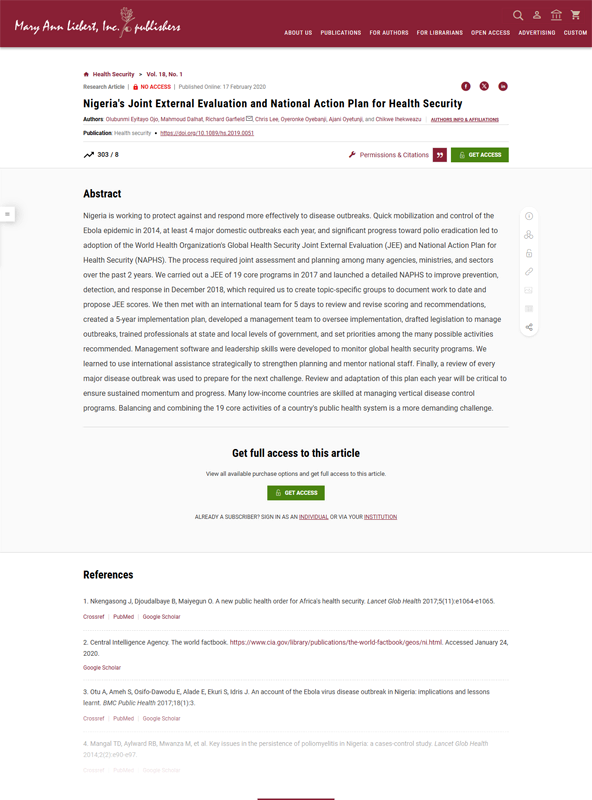
Nigeria’s adoption of the World Health Organization’s Joint External Evaluation (JEE) and National Action Plan for Health Security (NAPHS) will strengthen its national health security efforts. Writing in Health Security, experts at Resolve to Save Lives document the process of completing a JEE with partners in Nigeria in 2017 and subsequently creating a NAPHS to […]
Multisectoral resilience for the next global health emergency
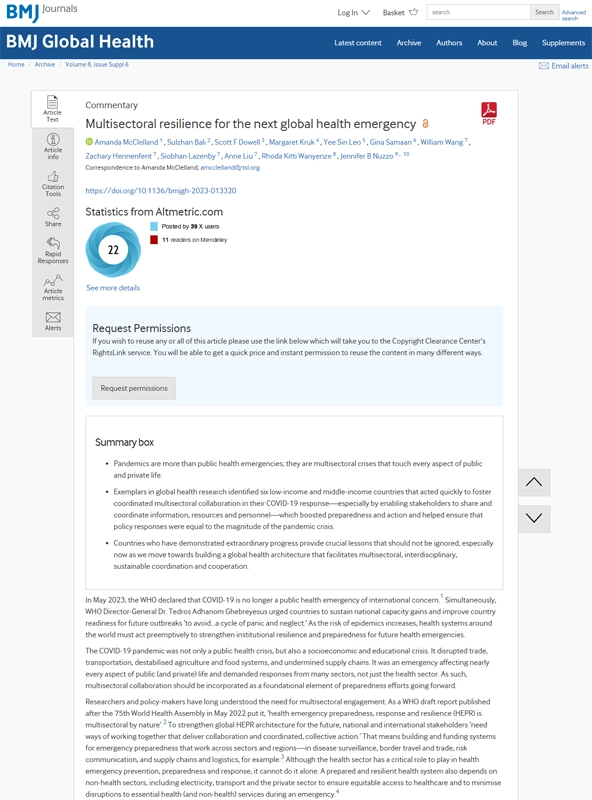
Pandemics are more than public health emergencies; they are multisectoral crises that touch every aspect of public and private life. Therefore, multisectoral coordination—especially by enabling stakeholders to share and coordinate information, resources and personnel—enables appropriate policy responses during crises. Writing in BMJ Global Health, experts at Resolve to Save Lives and our partners identify six […]
Modelling the economic burden of SARS-CoV-2 infection in health care workers in four countries
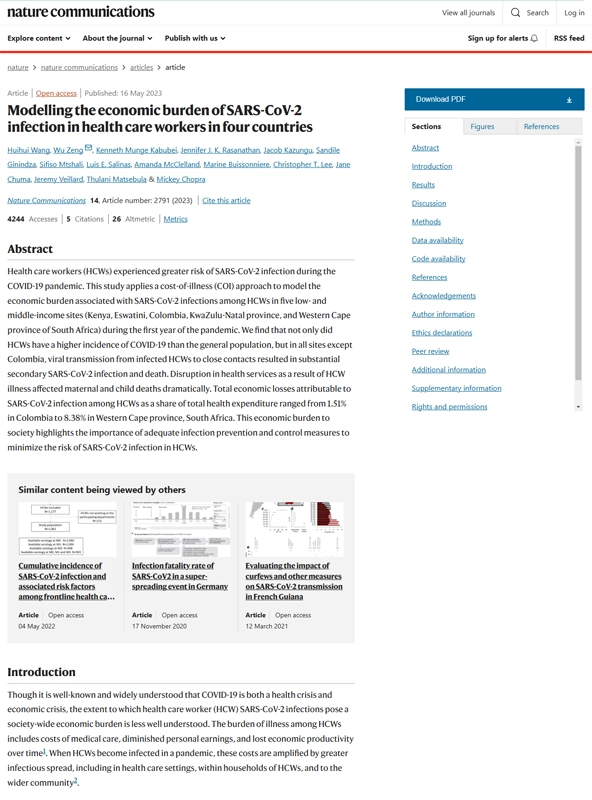
SARS-CoV-2 infections among health care workers caused up to 8.38% of total health expenditures in five low- and middle-income countries, underscoring a need for stronger protection measures for frontline workers, who faced increased risk of infection during the COVID-19 pandemic. Writing in Nature Communications, experts at Resolve to Save Lives used a a cost-of-illness (COI) […]
Investing in global health security: Estimating cost requirements for country-level capacity building
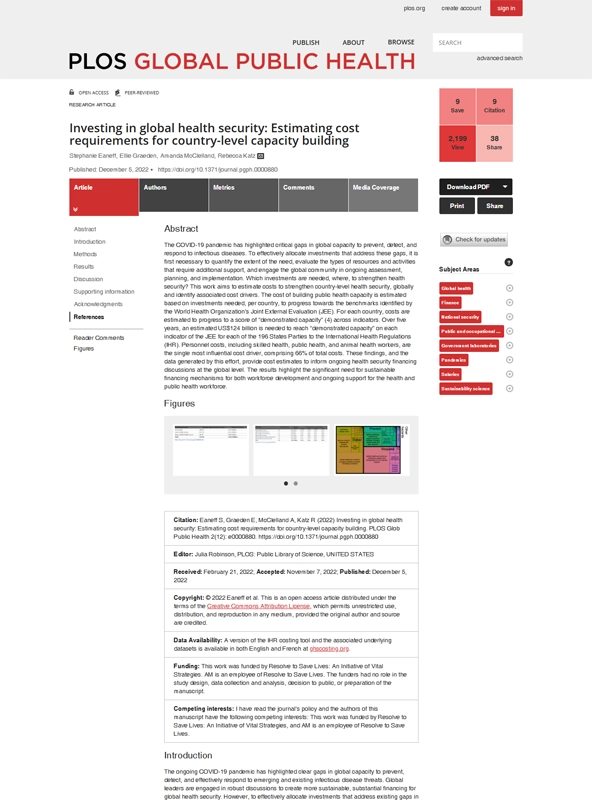
A targeted investment of $124 billion over five years will enable 196 countries to strengthen their core capacities across the World Health Organization (WHO)’s Joint External Evaluation (JEE) indicators. Writing in PLOS Global Public Health, experts at Resolve to Save Lives estimated the costs required to strengthen country-level health security and identified associated cost drivers. […]
Implementation of the 7-1-7 target for detection, notification, and response to public health threats in five countries: a retrospective, observational study
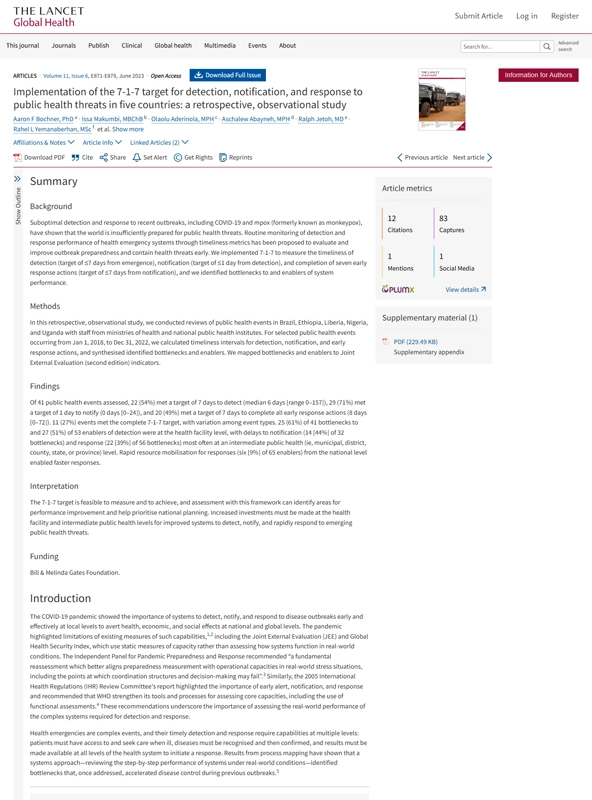
The 7-1-7 target supports timely detection, notification, and response to outbreaks. Writing in the Lancet Global Health, experts from Resolve to Save Lives assessed 41 public health events in Brazil, Ethiopia, Liberia, Nigeria, and Uganda between 2018 and 2022 to understand the frequency at which targets for detection (7 days), notification (1 day) and respones […]
Impact of a Newly Established Revolving Outbreak Investigation Fund on Timeliness of Response to Public Health Emergencies in Nigeria
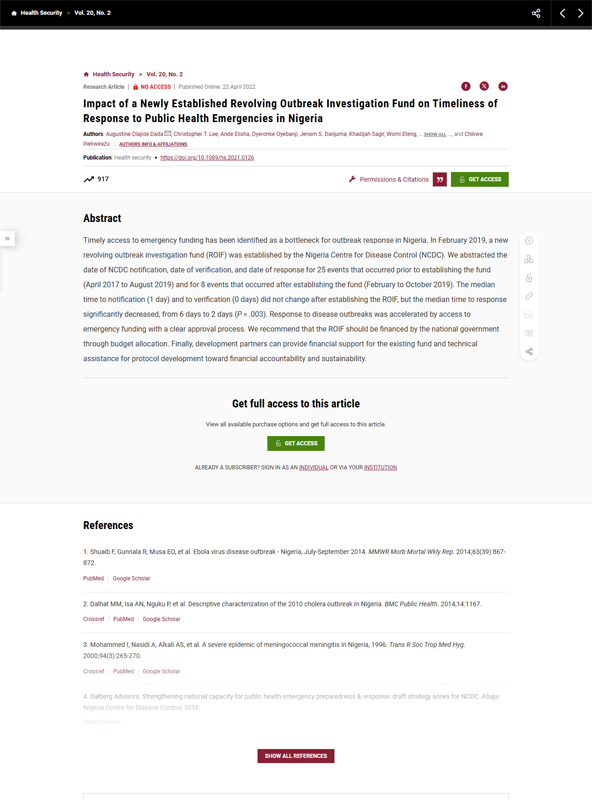
Revolving outbreak investigation funds (ROIF) can accelerate outbreak response times when coupled with streamlined approval processes. Writing in Health Security, experts from Resolve to Save Lives analyze the impact of ROIF in Nigeria, which were established by our partners at Nigeria’s Centre for Disease Control and Prevention (NCDC) in 2019. Comparing outbreak responses before and […]
Identifying and Interrupting Superspreading Events—Implications for Control of Severe Acute Respiratory Syndrome Coronavirus 2
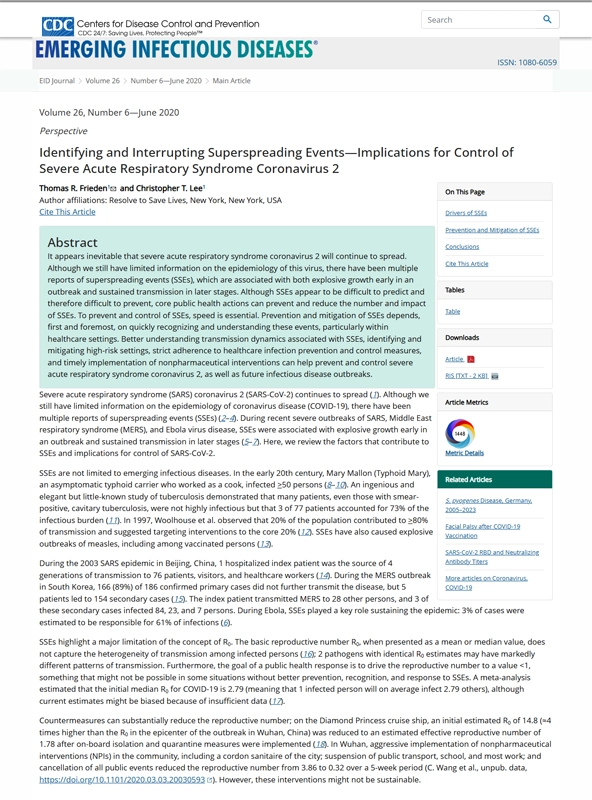
Strict adherence to infection prevention and control measures, and timely implementation of nonpharmaceutical interventions, can help prevent and control COVID-19. Writing in Emerging Infectious Diseases, experts at Resolve to Save Lives examine the role of superspreading events (SSEs) in the rapid spread of SARS-CoV-2, highlighting their potential to accelerate outbreaks and prolong transmission. We emphasize […]
COVID-19 / In-Depth Science Review: February 14, 2022 Annex
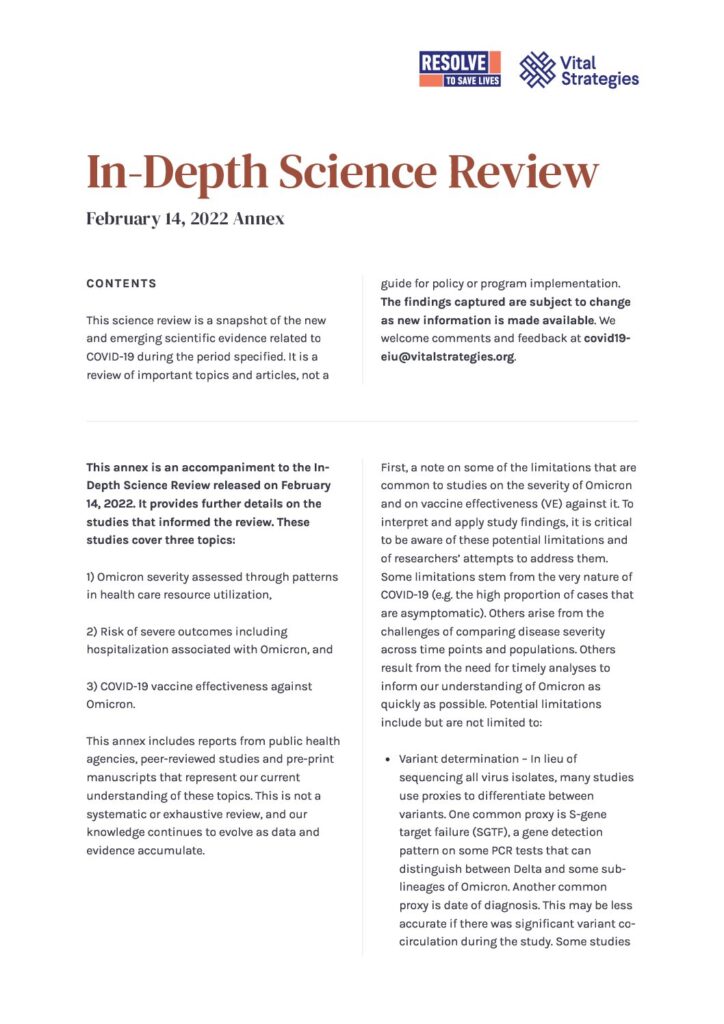
COVID-19 severity and vaccine effectiveness in the era of the Omicron variant. This annex is an accompaniment to the InDepth Science Review released on February 14, 2022. It provides further details on the studies that informed the review. This science review is a snapshot of the new and emerging scientific evidence related to COVID-19 during […]
COVID-19 / In-Depth Science Review: February 14, 2022
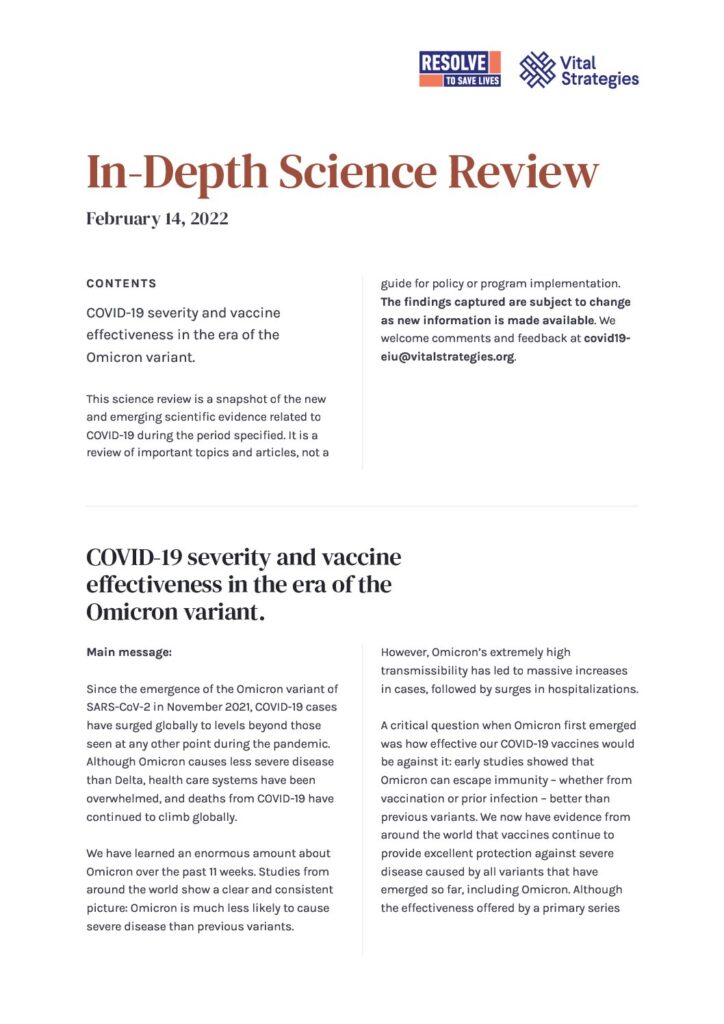
COVID-19 severity and vaccine effectiveness in the era of the Omicron variant. This science review is a snapshot of the new and emerging scientific evidence related to COVID-19 during the period specified. It is a review of important topics and articles, not a guide for policy or program implementation. The findings captured are subject to change […]
COVID-19 / In-Depth Science Review: December 22, 2021
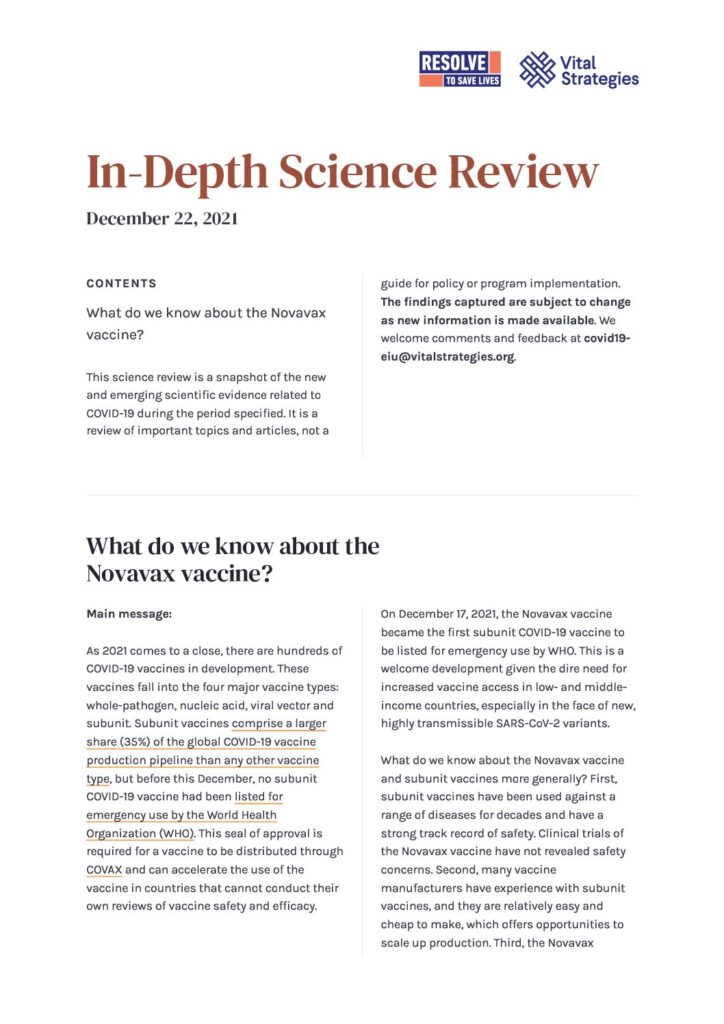
What do we know about the Novavax vaccine? This science review is a snapshot of the new and emerging scientific evidence related to COVID-19 during the period specified. It is a review of important topics and articles, not a guide for policy or program implementation. The findings captured are subject to change as new information […]
COVID-19 / In-Depth Science Review: November 1, 2021

The glut of COVID-19 vaccines is a myth: How we can — and must — remove barriers to vaccinating the world against COVID-19 This science review is a snapshot of the new and emerging scientific evidence related to COVID-19 during the period specified. It is a review of important topics and articles, not a guide […]
COVID-19 / In-Depth Science Review: September 1, 2021
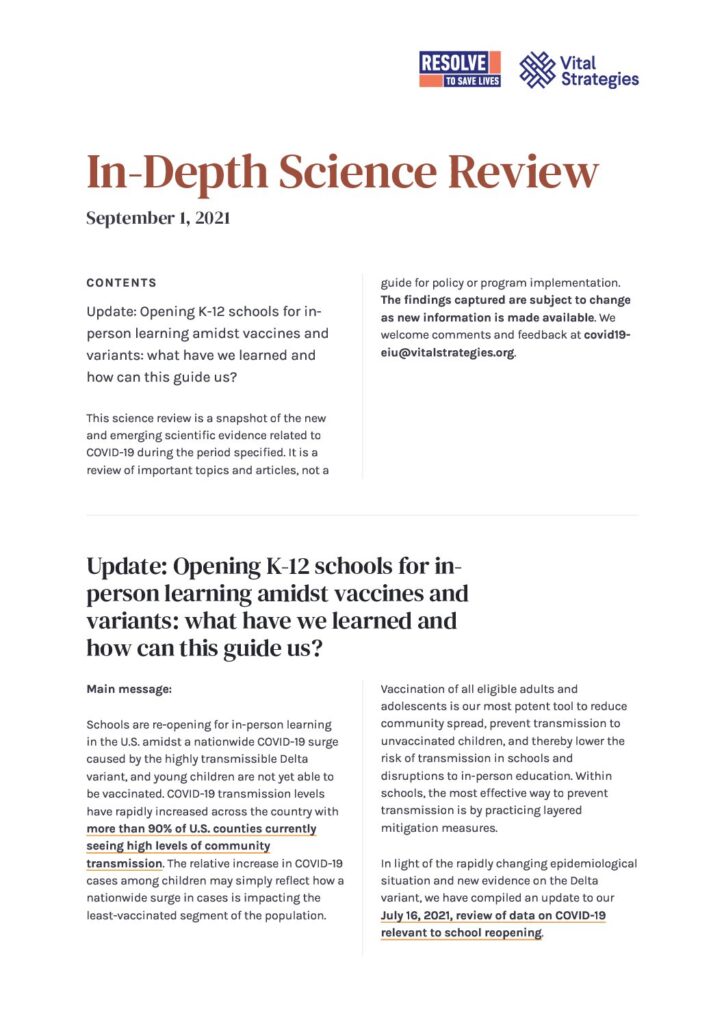
Update: Opening K-12 schools for in-person learning amidst vaccines and variants: what have we learned and how can this guide us? This science review is a snapshot of the new and emerging scientific evidence related to COVID-19 during the period specified. It is a review of important topics and articles, not a guide for policy […]
COVID-19 / In-Depth Science Review: August 20, 2021
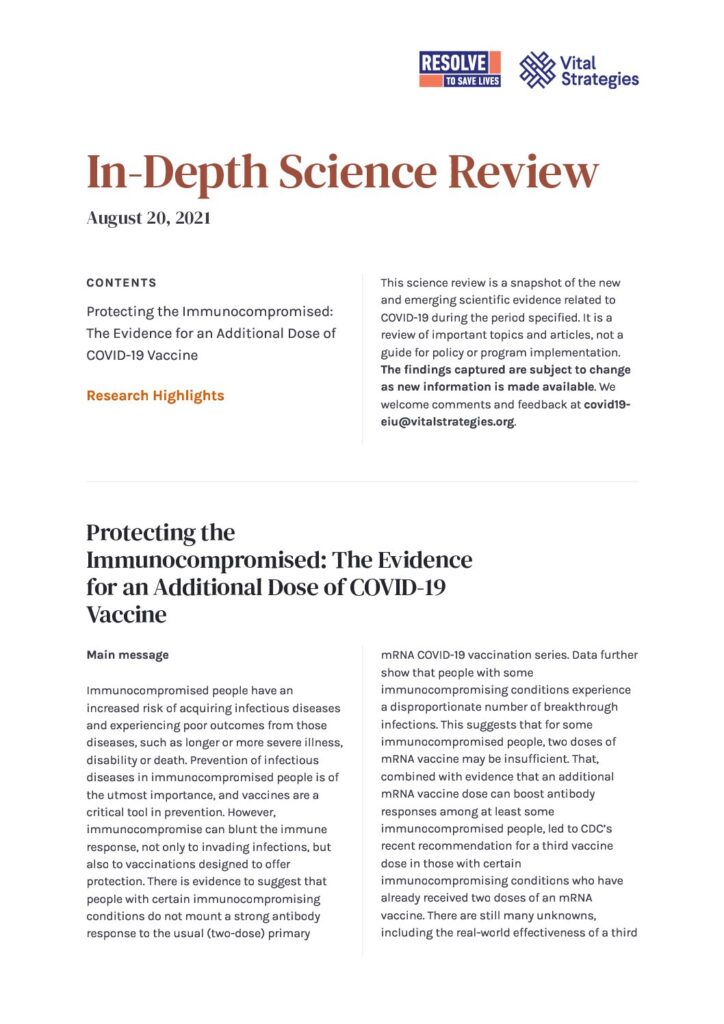
Protecting the Immunocompromised: The Evidence for an Additional Dose of COVID-19 Vaccine. This science review is a snapshot of the new and emerging scientific evidence related to COVID-19 during the period specified. It is a review of important topics and articles, not a guide for policy or program implementation. The findings captured are subject to change […]
COVID-19 / In-Depth Science Review: August 2, 2021
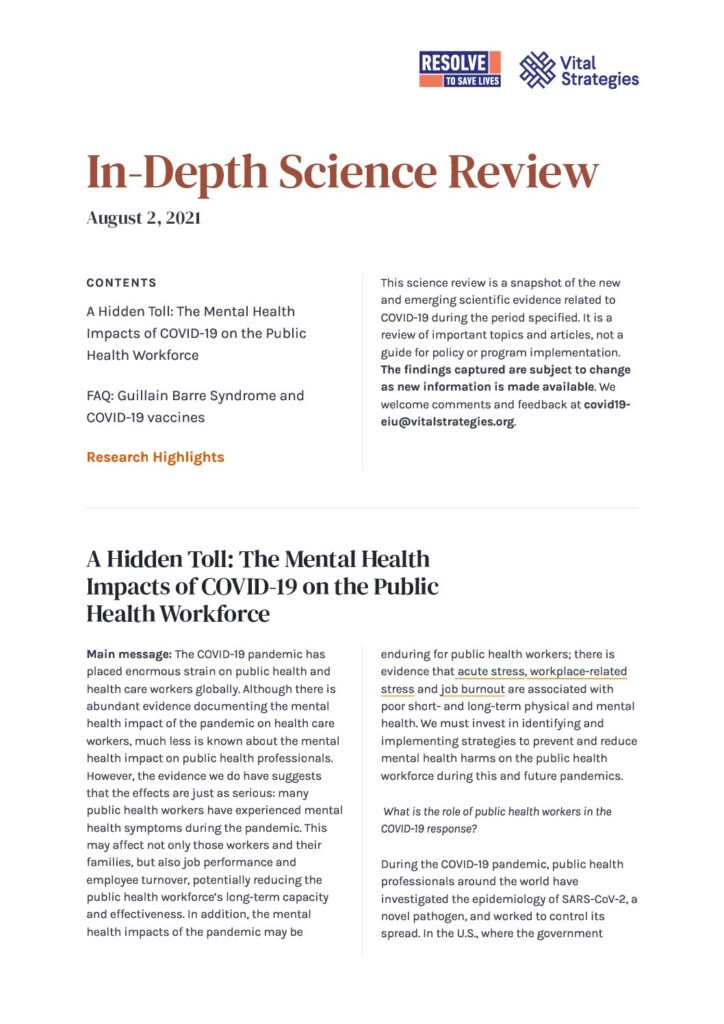
A Hidden Toll: The Mental Health Impacts of COVID-19 on the Public Health Workforce. This science review is a snapshot of the new and emerging scientific evidence related to COVID-19 during the period specified. It is a review of important topics and articles, not a guide for policy or program implementation. The findings captured are subject […]
COVID-19 / In-Depth Science Review: July 16, 2021
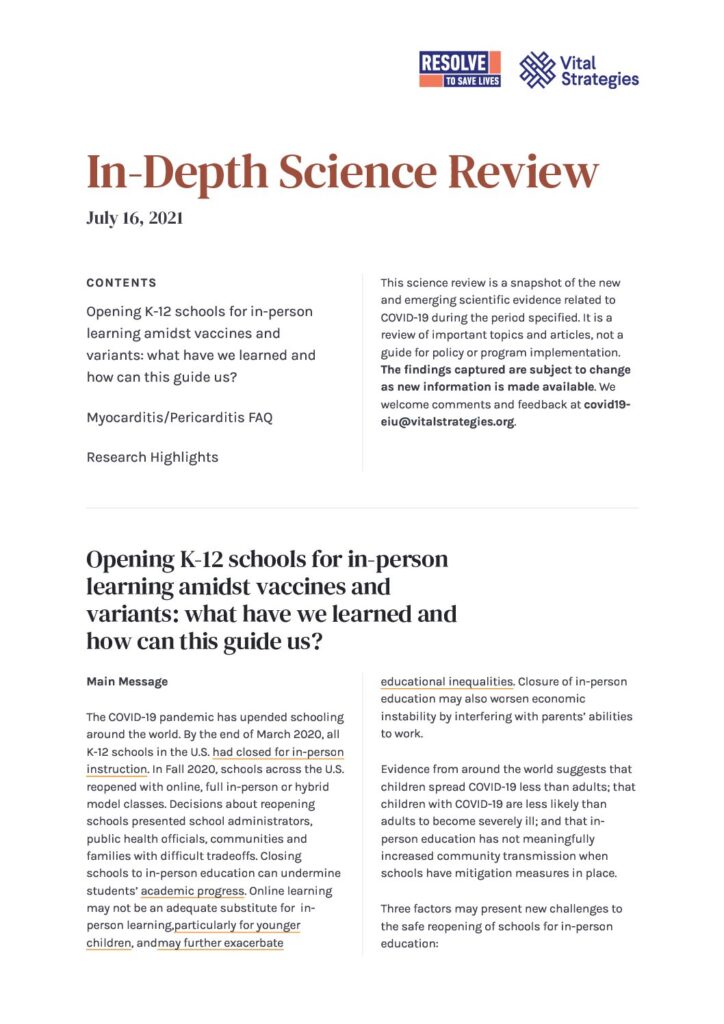
Opening K-12 schools for in-person learning amidst vaccines and variants: what have we learned and how can this guide us? This science review is a snapshot of the new and emerging scientific evidence related to COVID-19 during the period specified. It is a review of important topics and articles, not a guide for policy or […]
From lionizing to protecting health care workers during and after COVID‐19—systems solutions for human tragedies
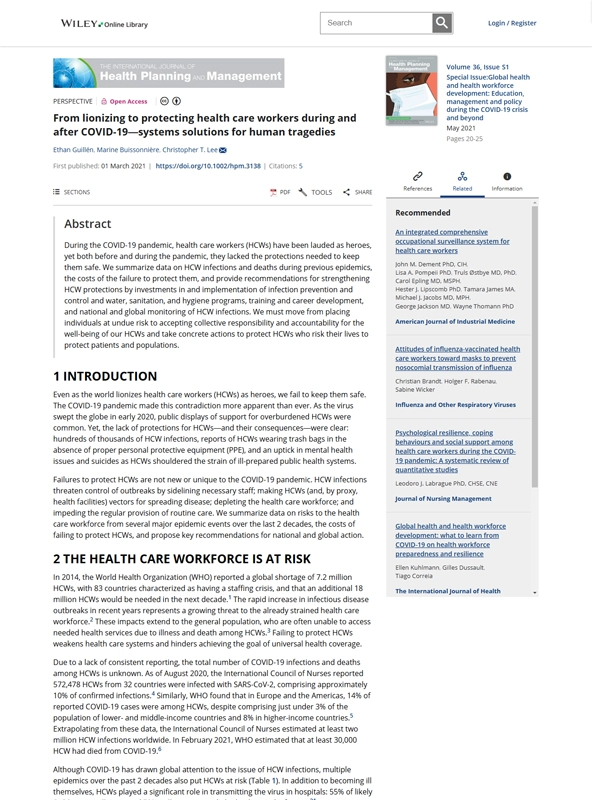
Frontline health care workers need full protections in the form of infection prevention and control (IPC) measures, water, sanitation and hygiene (WASH) programs, and expanded training opportunities. Writing in the International Journal of Health Planning and Management, experts at Resolve to Save Lives review health care worker infections and deaths during previous epidemics, illustrating the […]
COVID-19 / In-Depth Science Review: June 4, 2021
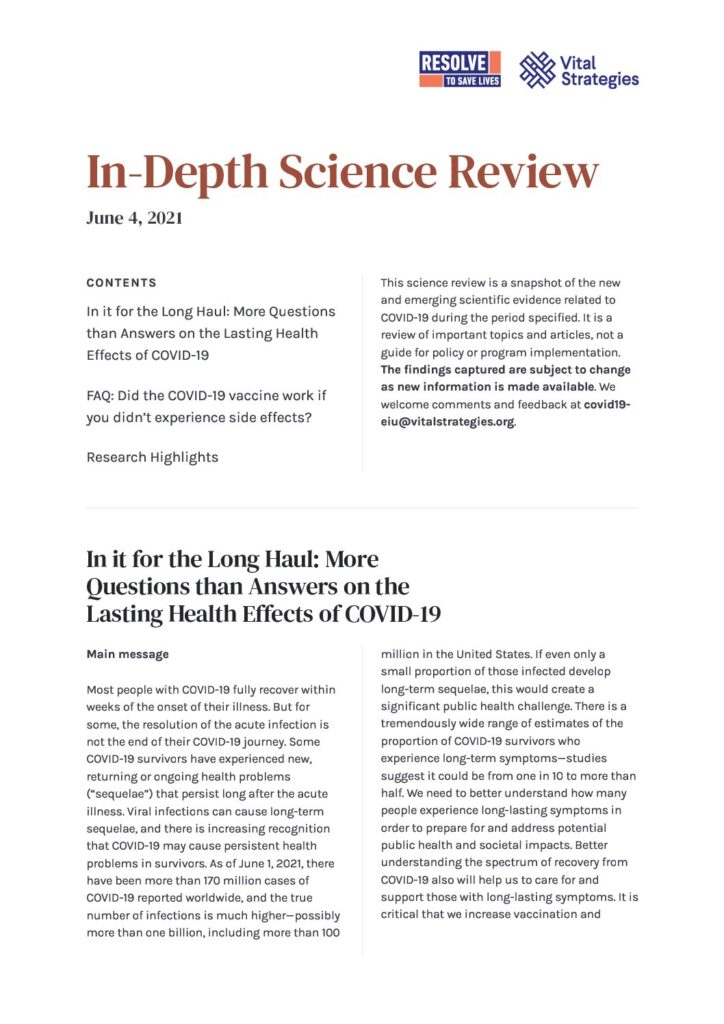
In it for the Long Haul: More Questions than Answers on the Lasting Health Effects of COVID-19 This science review is a snapshot of the new and emerging scientific evidence related to COVID-19 during the period specified. It is a review of important topics and articles, not a guide for policy or program implementation. The findings […]
Feasibility, enablers and challenges of using timeliness metrics for household contact tracing and TB preventive therapy in Pakistan
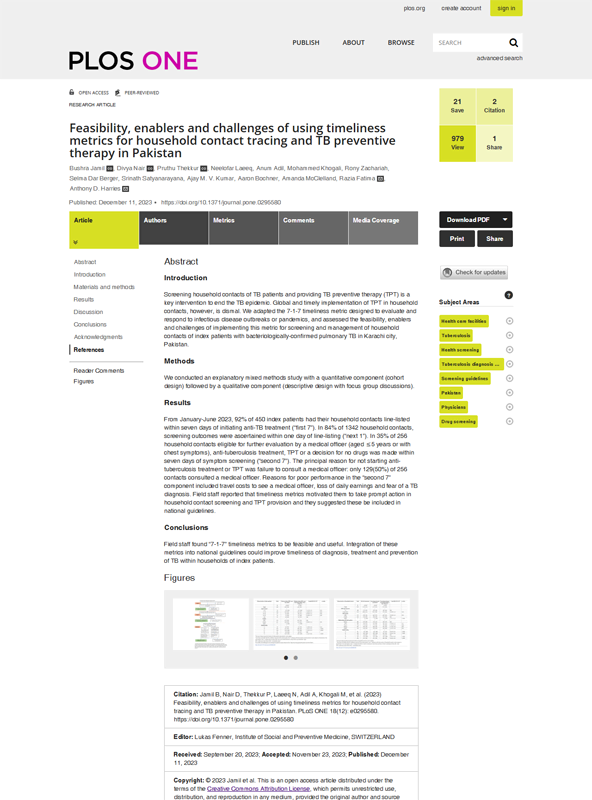
Experts from Resolve to Save Lives expamined the feasibility of adapting the 7-1-7 target to control tuberculosis in Karachi, Pakistan through timely provision of TB preventive therapy (TPT). From January to June 2023, we successfully line-listed 92% of 450 index patients’ household contacts within seven days of initiating anti-TB treatment. Additionally, we determined screening outcomes […]
Digital Point Solutions for Extending Contact Tracing Capacity
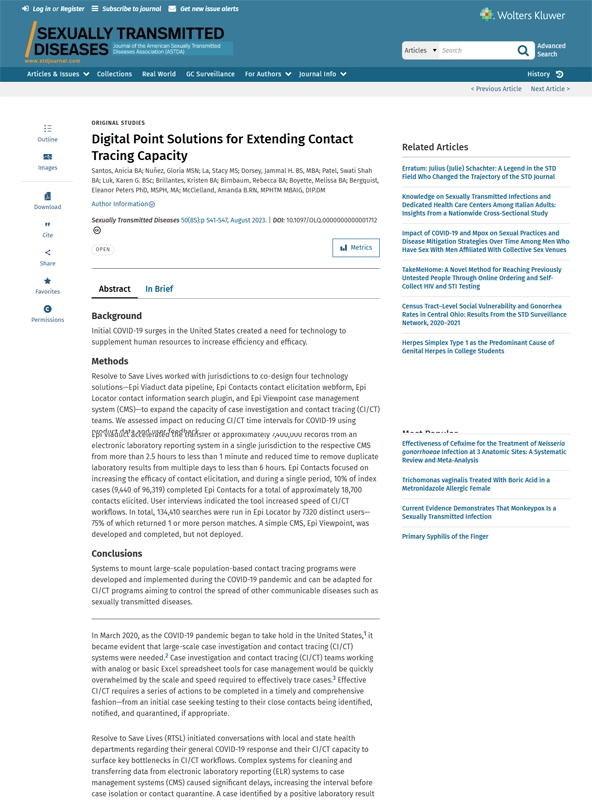
In the wake of the COVID-19 pandemic, Resolve to Save Lives collaborated with U.S. jurisdictions to create four digital solutions that enhance the efficiency of case investigation and contact tracing to reduce the spread of infectious diseases by enabling more precise outreach, timely interventions, and better confidentiality: Epi Viaduct, Epi Contacts, Epi Locator, and Epi […]
COVID-19 / In-Depth Science Review: April 17 – May 13, 2021
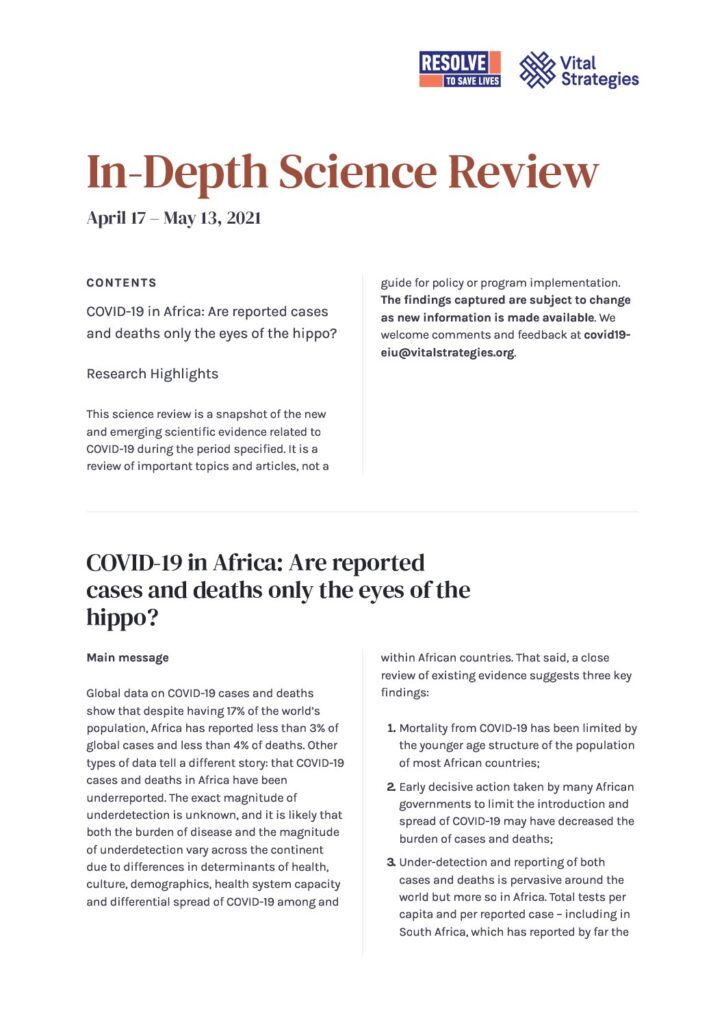
COVID-19 in Africa: Are reported cases and deaths only the eyes of the hippo? This science review is a snapshot of the new and emerging scientific evidence related to COVID-19 during the period specified. It is a review of important topics and articles, not a guide for policy or program implementation. The findings captured are subject […]